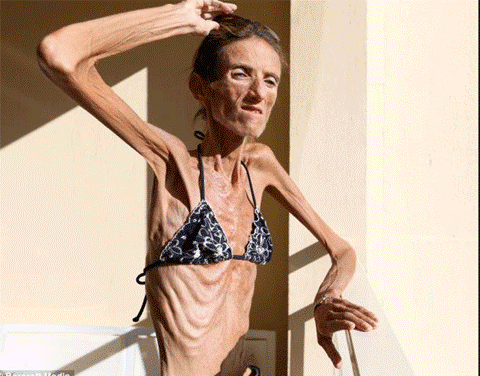Breaking the Illusion: When Beauty Becomes a Battle
Let’s be honest—we’re drowning in a sea of curated images. Picture-perfect bodies, airbrushed skin, and impossible standards chase us through every swipe, scroll, and screen. But what happens when chasing that ideal turns deadly? That’s the reality Valeria Levitin lived through. And now, her story isn’t just haunting—it’s life-saving.

Valeria’s journey isn’t about spotlight or style—it’s about reclaiming life. Once known globally for her emaciated frame, she’s now known for something far more powerful: telling the brutal truth behind eating disorders and offering a light to those still trapped in the dark.
The Early Pressure to Be “Perfect”
Valeria’s struggle didn’t start with modeling gigs or media attention. It started at home.
Growing up in Russia, she was constantly reminded that smaller meant better. The message was subtle, then suffocating. Her family linked love and approval to how little space she took up. And when your worth gets tied to your weight, it leaves scars you can’t see—but they cut deep.
At sixteen, after moving to the United States, she began dieting. But this wasn’t a phase. It was extreme. What started as a desire to fit in became an obsession with shrinking—physically and emotionally.

A Toxic Industry Fueled Her Downward Spiral
Entering the modeling world should’ve been a dream. Instead, it was a nightmare.
Agencies told her to lose more weight—even when she was already dangerously thin. Can you imagine that? Being told your bones still weren’t “beautiful” enough?
The industry praised her appearance while her health crumbled. At just 24, Valeria’s body was on the brink. Her muscles wasted away, her bones grew brittle, and her organs were under constant stress. And yet, instead of being helped, she was still being asked to shrink more.

Living in a Body That Was Falling Apart
Eventually, Valeria dropped below 60 pounds. That’s not just thin—it’s life-threatening. Every day became a physical and emotional battlefield.
Simple acts like walking or sitting were dangerous. Her body hurt. Her spirit dimmed. And yet, the world kept watching—some with concern, others with disturbing admiration.
But what people saw on the outside didn’t reflect her reality. Valeria wasn’t proud. She wasn’t glamorous. She was hanging on. Barely.
When Admiration Turns into a Dangerous Obsession
As photos of Valeria surfaced online, they went viral for all the wrong reasons.

Young girls, some barely teenagers, reached out to her. Not for help—but for advice. They wanted to look like her. They saw her skeletal frame as a twisted kind of goal.
Valeria didn’t stay silent. She met their messages with raw honesty.
“I’m not here to teach girls how to die.”
Let that sink in. While others romanticized her condition, she fought back with truth. Her life wasn’t a template—it was a warning.
Turning Pain Into Purpose
Instead of retreating into shame or isolation, Valeria chose something braver—she spoke up.
She started using her voice to advocate for mental health, raise awareness about eating disorders, and dismantle toxic beauty standards. What she couldn’t reclaim in her body, she rebuilt in her mission.

Her ultimate dream? To become a mother. That vision—of nurturing life, not destroying it—drives her to keep going, to keep fighting, and to keep speaking for those still too afraid to.
Social Media’s Role in the Modern Epidemic
If you think this issue is behind us, think again.
In the age of filters, retouching apps, and “what I eat in a day” content, the pressure is worse than ever. We’re constantly bombarded by so-called “perfection”—and it’s easy to forget what’s real and what’s damaging.
Valeria’s story is a reminder that behind every seemingly flawless post could be a battle no one sees. A reminder that health isn’t measured by likes or dress sizes.

Catching the Signs Before It’s Too Late
Here’s the most heartbreaking part—eating disorders rarely scream. They whisper.
One skipped meal turns into five. A compliment about weight loss becomes a reason to starve. And before you know it, a diet spirals into something deadly.
That’s why early intervention matters. If you notice someone withdrawing, obsessing over food, or avoiding meals—it’s time to speak up. Not with judgment. But with care.
A Wake-Up Call for Us All
Valeria Levitin didn’t choose to become a cautionary tale. But now, she’s choosing to be a catalyst for change.
Her message is simple but profound: “Your health is more valuable than any number on the scale.”
And she’s right. No amount of praise, no dream job, no societal validation is worth your life. It’s time we stop worshipping size and start celebrating survival, strength, and self-respect.
We’re More Than What We See in the Mirror
Valeria’s journey is painful. It’s raw. But it’s also filled with power.
She teaches us that healing is louder than hiding. That our value isn’t found in inches lost, but in the joy we reclaim. Her life now is built on truth, not trends—and that’s the kind of beauty that actually saves lives.

So, if you’ve ever felt like your worth depends on shrinking, fitting in, or disappearing—let this story shake you. Because you are enough. As you are. Right now.
And if Valeria can pull light from such darkness, so can you.
Conclusion
Valeria Levitin’s story is more than just a warning—it’s a wake-up call. In a world that idolizes appearances, she’s chosen to champion authenticity, health, and purpose. She took unimaginable pain and turned it into power. And for every person quietly battling an eating disorder, her voice says what they need to hear: You are not alone. You are not broken. You are worth saving.
Let’s start celebrating bodies that are living, not just looking. Let’s rewrite the definition of beauty—together.

